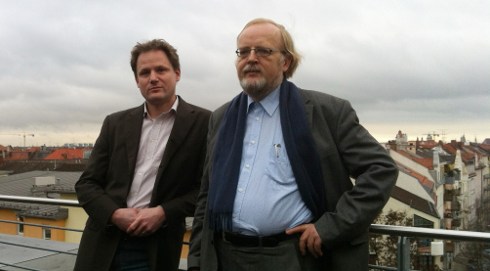EU Patent Package: JURI has Spoken, But What did it Say? (UPDATE)
Yesterday the members of the EU Parliament’s Legal Affairs Committee (JURI) voted in three separate sessions on the EU patent package (see nos. 18 to 21 of agenda):
- Enhanced cooperation in the area of the creation of unitary patent protection, JURI/7/05848, Rapporteur: Bernhard Radkay (S&D).
- Enhanced cooperation in the area of the creation of unitary patent protection with regard to the applicable translation arrangements, JURI/7/05847, Rapporteur: Raffaele Baldassarre (PPE).
- Jurisdictional system for patent disputes, JURI/7/06168, Rapporteur: Klaus-Heiner Lehne (PPE).
Fitting into the parliamentary tradition of issuing celebrating press releases when it comes to the future EU patent system, like
- A step closer to an EU patent (22 Nov 2011) or
- Done deal on the EU patent? (01 Dec 2011),
yesterday’s post-vote press statement was titled
- EU patent gets Legal Affairs Committee green light (20 Dec 2011),
disclosing, besides the well-known mantras as to the beneficial effects of the new European patent system, the liberating message that
Legal Affairs Committee MEPs backed a political deal struck last 1 December between Parliament and Council negotiators on the so-called “EU patent package” [...]. If Parliament as a whole and the Council confirm the deal, a new EU patent will be created.
 As something like a pre-Christmas present, the European Patent Office startet off into the bright future of online communication and interaction last week.
As something like a pre-Christmas present, the European Patent Office startet off into the bright future of online communication and interaction last week.
On 13 December 2011 a President’s Decision and a related Notice introduced the notification of communication in selected EPO proceedings via online mailboxes (entered into force on 15 December 2011), while a Notice dated 15 December 2011 informed on the newly launched web-based consultation platform for proposed changes to European patent law and practice.
Recently I spotted an entry for Document 15856/11 in the Public Register of the EU Council. The paper is titled OPINION OF THE LEGAL SERVICE – Draft agreement on the European Union Patent Jurisdiction (doc.13751/11) – compatibility of the draft agreement with the Opinion 1/09 and marked confidential (“LIMITE“). After having filed a request based on Regulation (EC) No 1049/2001 of the European Parliament and of the Council of 30 May 2001 regarding public access to European Parliament, Council and Commission documents I was served with a heavily redacted version of the requested Document.
In the effect, all significant portions of the Document were deleted. The only real disclosure is to be drawn the introductory narrative:
At the Competitiveness Council on 29 September 2011 the Legal Service was asked about the compatibility with Opinion 1/091 of the Court of Justice of the European Union (the “Court of Justice”) of a draft agreement on the European Union Patent Jurisdiction (hereinafter “the current draft agreement”), elaborated by the Presidency of the Council in September 20112. This contribution further develops and constitutes a written version, requested by the Council, of the statement made orally at that meeting.
Continue reading »
When Poland took over the EU Council Presidency in summer, the incoming Polish Presidency emphasised in a Note its determination to wisely utilise the “momentum for finalising the legislative processes” and “to continue the work in parallel on both [creation of unitary patent protection and creation of a unified patent litigation system], with a view to reaching an overall political agreement within the Council at the end of this year”.
In November, the Polish Presidency announced in Document 17539/11 its intention to organise an initialling ceremony whereby the text of the Unitary Patent Court Agreement could be finalised in Warsaw on 22 December 2011 (see also here). As the Competitiveness Council meeting on 5 December 2011 ended with the positive news that only the seat of the Central Division of the Unitary Patent Court remains to be decided, hopes increased that the new European Unitary Patent may become reality by the end of this months, when Poland will pass the Presidency baton over to Denmark.
As reported earlier, there is a strong desire of (parts of) industry [1, 2] and patent professionals [1, 2, 3], politically supported by JURI member Wikström and UK IP Minister Baroness Wilcox, to remove Articles 6 to 8 dealing with substantive patent law on patent infringement from the proposed Regulation. The fears of those groups are that otherwise substantive patent law would become part of EU legal order causing costs, delays, legal uncertainty. A related resolution of the European Patent Lawyers Association EPLAW expressed such concerns recently in a rather pointed way:
If one wants a really unattractive, inefficient, unpredictable and probably extremely expensive patent court system, then we will get it; one must only give the ECJ a chance to receive as many referrals in patent law as possible.
If one wants to see substantive patent law in Europe to be decided by judges without any solid knowledge and experience in this field, then one must involve the ECJ whenever possible.
And if somebody intended to lay a solid ground for failure of this – at some time very promising – project, then he will probably succeed.
Now there is evidencs (see e.g. this tweet) suggesting that Ms Wikstrom has lost the battle over Articles 6 to 8, so that the provisions dealing with substantive patent law on patent infringement will remain part of the Unitary Patent.
 FICPI is one of the large international federations of IP attorneys. In its capacity as a professional representation especially of European Patent Attorneys and national Patent Attorneys in EPC/EU states in private practice, this “Position Paper on the Unitary Patent and the Unified Patent Court” has been prepared and submitted in support of profession’s and their client’s interests. The document carries the date of 3 December 2011 and has been submitted on 4 December (Sunday), i.e. one day before the decisive EU Council meeting on 5/6 Decmber (result see here) but, apparently, after the not less decisive meetings of the Legal Affairs Committee (JURI) of the EU Parliament in preparation of the Council meeting, so that the paper’s impact on the political process is probably limited.
FICPI is one of the large international federations of IP attorneys. In its capacity as a professional representation especially of European Patent Attorneys and national Patent Attorneys in EPC/EU states in private practice, this “Position Paper on the Unitary Patent and the Unified Patent Court” has been prepared and submitted in support of profession’s and their client’s interests. The document carries the date of 3 December 2011 and has been submitted on 4 December (Sunday), i.e. one day before the decisive EU Council meeting on 5/6 Decmber (result see here) but, apparently, after the not less decisive meetings of the Legal Affairs Committee (JURI) of the EU Parliament in preparation of the Council meeting, so that the paper’s impact on the political process is probably limited.
The position paper does not appear to be available via the FICPI website yet, but has been referred to in this tweet on @FICPI, demanding to “‘Go Slowly’ on Unitary Patent and Unified Patent Court” (see related press release).
On December 02, 2011, the General Secretariat of the EU Council sent to Permanent Representatives Committee (COREPER Part 1) Document 17407/11 titled Draft agreement on the Unified Patent Court – Relationship of the draft agreement on the Unified Patent Court with Regulation (EC) No 44/2001 Brussels I, originally classified LIMITE.
I was able to obtain a copy of that Document by means of a request in accordance with Article 15(3), third subparagraph, of the TFEU. Specific rules governing this kind of public access to Council documents are established in Annex II to the Council’s rules of procedure. These rules apply mutatis mutandis to European Council documents, as stipulated in Article 10(2) of the rules of procedure of the European Council.
In fact, Document 17407/11 conveys a non-paper from the Commission services dated November 30, 2011. The Commission services have considered the relationship of the draft agreement on the Unified Patent Court in the version of Council documents 16741/11 of November 11, 2011 and 17539/11 of November 24, 2011 with Regulation (EC) No 44/2001 on jurisdiction and the recognition and enforcement of judgments in civil and commercial matters (the Brussels I Regulation). The non-paper presents, to the extent possible, solutions to arrange that relationship in a legally sound and certain manner. The proposed solutions should be considered preliminary.
Of course, in the current situation problems concerning the relationship between the envisaged UPC agreement, on the one hand, and Bruisels I, on the other hand, clearly appear to be of lesser importance. However, these aspects surely contribute to the overall weight of problems to be resolved in principal before the intended ceremony on December 22, 2011, can take place in Warsaw.
Continue reading »
After the EU Competitive Council’s debate on the EU Patent Package (Regulation covering the Unitary Patent and its Language Regime and an international treaty covering the Unified Patent Court) ended Monday night, a nightly press report explained that only a few more days were needed to reach an agreement on the whole package, while the negotiators of the Polish Presidency added that “only the seat of the Central Division of the Unitary Patent Court needs to be decided”.
Before the Council meeting London and Munich were said to be the favourite cities for hosting the seat of the 1st Instance Central Division (see here or here), while Luxembourg was set for the seat of the 2nd Instance Court of Appeal since the home of the European Court of Justice (CJEU) for some reason was the only candidate for hosting this authority. Immediately after the meeting it was reported that the German and UK delegations objected to the Presidency’s compromise suggestion to have the “seat of the main litigation court for the upcoming EU patent” in Paris (see details here or here).
Since then the it looks like the candidate list changes constantly, as further candidates appear to throw down their gauntlet in the competition to host the Central Division, while others may have minimised their chances due to very recent political moves.
Parallel to these negotiations speculations sprout up that Italy and maybe also Spain might abandon their resistance against becoming a member state of the Unitary Patent. Especially in the case of Italy – now governed by pro-Europe Prime Minister Mario Monti who actively supported the Unitary Patent (see e.g. EU press releases IP/97/558 of 6/97 or IP/99/105 of 2/99) when he was a member of the European Commission from 1994 to 2004, first as Commissioner for the Internal Market (and thus predecessor of Michel Barnier who currently is in charge of the patent reform) and then as Commissioner for Competition – such rumours were reinforced by Mr Pierre Delsaux, deputy director general under Commissioner Barnier, who was reported to have revealed that Mario Monti is in fact considering joining the unitary system (see also tweet).
Monday’s Competitive Council meeting under the Polish Presidency (Chair: Waldemar Pawlak, Deputy Prime Minister and Minister of Economy of Poland) was intended to finalise the EU Patent Package (i.e. a EU regulation covering the Unitary Patent and the its language regime and an international agreement on the Unified Patent Court). Right after the meeting it appead that, based on a compromise proposal by the Presidency, this aim was missed only by a faily small margin since, as was explained in a nightly press release
[...] The debate took place on the basis of a compromise package drawn up by the Presidency. The compromise was broadly accepted in substance, but the debate showed that further work is still needed. The Polish Presidency is committed to take the work forward with a view to reaching agreement on the creation of a unified patent court before end 2011. [...],
combined with a Presidency tweet according to which “only the seat of the Central Division of the Unitary Patent Court needs to be decided“, apparently meaning that all other issues have been fixed. And in fact, a supplementary press release of the Polish Presidency titled “Agreement on substantial issues of single EU patent” clearly confirmed that
Out of the whole patent package the only remaining issue to be decided is the seat of the central division of the Unitary Patent Court UPC (Court of the First Instance).
The k/s/n/h::law blog
Some of the patent attorneys of the KSNH law firm have joined their efforts to research what is going on in the various branches of IP law and practice in order to keep themselves, their clients as well as interested circles of the public up to date. This blog is intended to present results of such efforts to a wider public.
Blog Archives
- November 2013 (2)
- October 2013 (1)
- September 2013 (1)
- August 2013 (2)
- July 2013 (3)
- June 2013 (5)
- March 2013 (5)
- February 2013 (4)
- January 2013 (5)
- December 2012 (5)
- November 2012 (5)
- July 2012 (5)
- June 2012 (8)
- May 2012 (5)
- April 2012 (3)
- March 2012 (4)
- February 2012 (5)
- January 2012 (6)
- December 2011 (12)
- November 2011 (9)
- October 2011 (9)
- September 2011 (4)
- August 2011 (7)
- July 2011 (4)
- June 2011 (1)
Blog Categories
- business methods (6)
- EPC (7)
- EPO (12)
- EU law (92)
- ACTA (8)
- CJEU (4)
- Comitology (1)
- competition law (2)
- Enforcement (6)
- EU Unified Patent Court (62)
- FTA India (1)
- TFEU (2)
- Trade Marks (5)
- European Patent Law (37)
- German Patent ACt (PatG) (1)
- German patent law (5)
- Germany (6)
- Pirate Party (3)
- International Patent Law (4)
- PCT (2)
- IP politics (10)
- licenses (2)
- Litigation (5)
- Patentability (7)
- Patents (12)
- Piratenpartei (2)
- Software inventions (10)
- Uncategorized (9)
- Unitary Patent (24)
- US Patent Law (4)
Comments
- kelle on Germany: Copyright Protection More Easily Available For Works Of “Applied Arts”
- Time Limits & Deadlines in Draft UPCA RoP: Counting The Days - KSNH Law - Intangible.Me on Wiki Edition of Agreement on Unified Patent Court Agreement (UPCA)
- Time Limits & Deadlines in Draft UPCA RoP: Counting The Days | ksnh::law on Wiki Edition of Agreement on Unified Patent Court Agreement (UPCA)
- Wiki Edition of Agreement on Unified Patent Cou... on Wiki Edition of Agreement on Unified Patent Court Agreement (UPCA)
- European Commission Takes Next Step Towards Legalising Software Patents in Europe | Techrights on EU Commission publishes Proposal of amendend Brussels I Regulation for ensuring Enforcement of UPC Judgements
Blogroll
- 12:01 Tuesday
- America-Israel Patent Law
- Anticipate This!
- AwakenIP
- BlawgIT
- BLOG@IPJUR.COM
- BP/G Radio Intellectual Property Podcast
- Broken Symmetry
- Class 46
- Director's Forum: David Kappos' Public Blog
- Gray on Claims
- I/P UPDATES
- IAM Magazine Blog
- Intellectual Property Intelligence Blog
- IP Asset Maximizer Blog
- IP CloseUp
- IP Dragon
- IP Watch
- IP Watchdog
- IPBIZ
- ipeg
- IPKat
- ITC 337 Law Blog
- Just a Patent Examiner
- K's Law
- MISSION INTANGIBLE
- Patent Baristas
- Patent Circle
- Patent Docs
- Patently Rubbish
- PatentlyO
- Patents Post-Grant
- Reexamination Alert
- SPICY IP
- Tangible IP
- The 271 Patent Blog
- The Intangible Economy
- THE INVENT BLOG®
- Think IP Strategy
- Tufty the Cat
- Visae Patentes
The KSNH blogging landscape


This blog and the German-language sister blog k/s/n/h::jur link to the two popular and privately run blogs IPJur und VisaePatentes and continue their work and mission with a widened scope and under the aegis of our IP law firm.
ksnhlaw on Twitter
- No public Twitter messages.
 KSNH::JUR Feed (german)
KSNH::JUR Feed (german)- Ist Verschlüsselung passé? September 6, 2013Auf verschiedenen Feldern beruflicher Praxis ist dafür zu sorgen, dass Kommunikation vertraulich bleibt. Die trifft beispielsweise für Ärzte zu, aber auch für Anwälte, darunter auch Patentanwälte. Einer der zahlreichen Aspekte, die in diesem Zusammenhang eine Rolle spielen, ist die Technik, um die Vertraulichkeit beruflicher Kommunikation sicherzustellen. Wa […]
- EU-Einheitspatent: Demonstrativer Optimismus und Zahlenmystik allerorten – Naivität oder politische Beeinflussung? June 26, 2013Nach mehreren vergeblichen Anläufen zur Schaffung eines EU-weiten Patentsystems wurde 1973 als Kompromiss das Europäische Patentübereinkommen unterzeichnet, welches unabhängig von der seinerzeit noch EWG genannten Europäischen Union System zur zentralisierten Patenterteilung mit nachgeordnetem Einspruchsverfahren durch das Europäische Patentamt schuf. Wie wi […]
- Moderne Zeiten oder: DPMA und Patentgericht streiten über die elektronische Akte April 25, 2013Bekanntlich hat das Deutsche Patent- und Markenamt (DPMA) im Jahre 2013 mit der rein technischen Fertigstellung der Einrichtungen zur elektronischen Akteneinsicht einen wichtigen Meilenstein seines Überganges von der Papierakte zur “elektronischen Akte” erreicht. Im DPMA werden aber bereits seit dem 01. Juni 2011 Patente, Gebrauchsmuster, Topografien und erg […]
- Gutachten zu Forschung, Innovation und technologischer Leistungsfähigkeit Deutschlands 2013 March 11, 2013Unter dem Datum vom 28. Februar 2013 ist die Bundestags-Drucksache 17/12611 veröffentlicht worden Sie trägt den Titel Unterrichtung durch die Bundesregierung - Gutachten zu Forschung, Innovation und technologischer Leistungsfähigkeit Deutschlands 2013. Die Bundesregierung legt dem Deutschen Bundestag seit dem Jahr 2008 […]
- 3D-Printing: Zum Filesharing von 3D-Modelldaten February 25, 2013In meiner kleinen zuvor angekündigten Reihe über rechtliche Aspekte des 3D Printing komme ich heute auf die Frage zu sprechen, ob die Hersteller von Gerätschaften es hinnehmen müssen, wenn Ersatztreile davon – vom Brillengestell über Smartphone-Gehäuseteile bis hin zu Rastenmähermotor-Abdeckungen – gescannt und die daraus […]
- Ist Verschlüsselung passé? September 6, 2013








